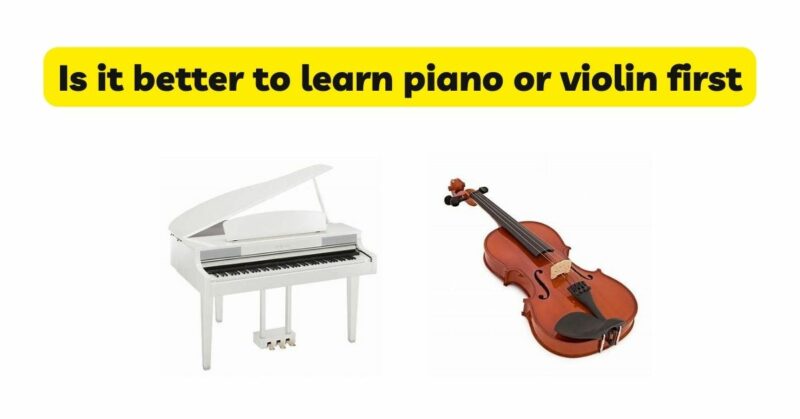When embarking on a musical journey, one of the crucial decisions to make is whether to learn the piano or the violin first. Both instruments offer unique challenges and rewards, making the choice a personal one based on various factors. In this article, we will explore the advantages and considerations of learning the piano or the violin as a beginner. By understanding the distinct qualities of each instrument, the learning process involved, and your personal goals and preferences, you can make an informed decision that aligns with your musical aspirations.
- Learning Curve and Technical Demands: Consideration of the learning curve and technical demands is vital when deciding which instrument to learn first. The piano offers a more gradual learning curve, as the keys produce consistent pitches and do not require precise finger placement or bowing techniques. This can make it more accessible for beginners. On the other hand, the violin presents physical challenges such as finger placement, bow control, and intonation. Its steep learning curve may require more patience, practice, and guidance. Assess your willingness to navigate technical demands and consider the learning pace that suits your preferences.
- Music Theory and Aural Skills: Learning the piano can provide a strong foundation in music theory and aural skills. The visual layout of the keyboard facilitates understanding of scales, intervals, chords, and harmonic progressions. Additionally, the piano’s ability to play multiple notes simultaneously aids in developing aural skills and harmonic awareness. On the contrary, the violin’s focus on melodic lines and single-note playing may place less emphasis on immediate music theory comprehension. However, the violin’s expressive qualities contribute to ear training and intonation development. Evaluate whether a solid grounding in music theory or aural skills is a priority in your musical journey.
- Musical Expression and Emotional Connection: Both the piano and the violin offer distinct avenues for musical expression and emotional connection. The violin’s ability to mimic the human voice and produce rich, lyrical tones lends itself to capturing a wide range of emotions. Its expressiveness is well-suited for melodic lines and intimate performances. Conversely, the piano’s versatility allows for exploring a broader spectrum of dynamics, textures, and harmonies. Its ability to play chords and create layered musical arrangements offers opportunities for a different type of musical expression. Consider the type of musical expression that resonates with you and aligns with your artistic goals.
- Repertoire and Genre Preferences: Consider your musical preferences and the repertoire associated with each instrument. The piano has an extensive repertoire spanning various genres, including classical, jazz, pop, and contemporary music. Its versatility allows you to explore a wide range of styles and composers. Alternatively, the violin has a rich heritage in classical music, with a vast repertoire of solo, chamber, and orchestral works. If you have a particular affinity for a specific genre or composer, it may influence your decision. Reflect on the musical styles and repertoire that inspire you to choose the instrument that aligns with your preferences.
- Instrumental Opportunities and Collaboration: Think about the instrumental opportunities and collaborative experiences that each instrument can offer. Learning the piano opens doors to accompanying other musicians, playing in ensembles, and engaging in collaborative projects. Its harmonic capabilities allow for supporting other instrumentalists or vocalists. Conversely, the violin provides opportunities for chamber music, orchestral playing, and solo performances. Consider whether you enjoy collaborative experiences, the type of musical setting you aspire to be a part of, and the opportunities available to you in your musical community.
- Long-Term Goals and Musical Aspirations: Your long-term goals and musical aspirations play a significant role in determining which instrument to learn first. Consider the musical path you envision for yourself. If you aspire to become a professional violinist, starting with the violin will allow you to focus on the specific techniques and repertoire associated with the instrument from an early stage. Similarly, if you have aspirations of becoming a professional pianist, beginning with the piano will set the foundation for developing technical proficiency and exploring a wide range of musical genres. Assess your ambitions and align them with the instrument that best supports your long-term goals.
Conclusion: Choosing between learning the piano or the violin first is a deeply personal decision influenced by factors such as the learning curve, technical demands, musical expression, genre preferences, collaborative opportunities, and long-term goals. Both instruments offer unique rewards and challenges, and there is no definitive answer as to which is better to learn first. Consider your own preferences, aspirations, and learning style to make an informed decision. Remember that the journey of learning an instrument requires dedication, practice, and patience. Regardless of which instrument you choose to learn first, embrace the process, enjoy the musical exploration, and allow your passion and dedication to guide you on your musical path.


